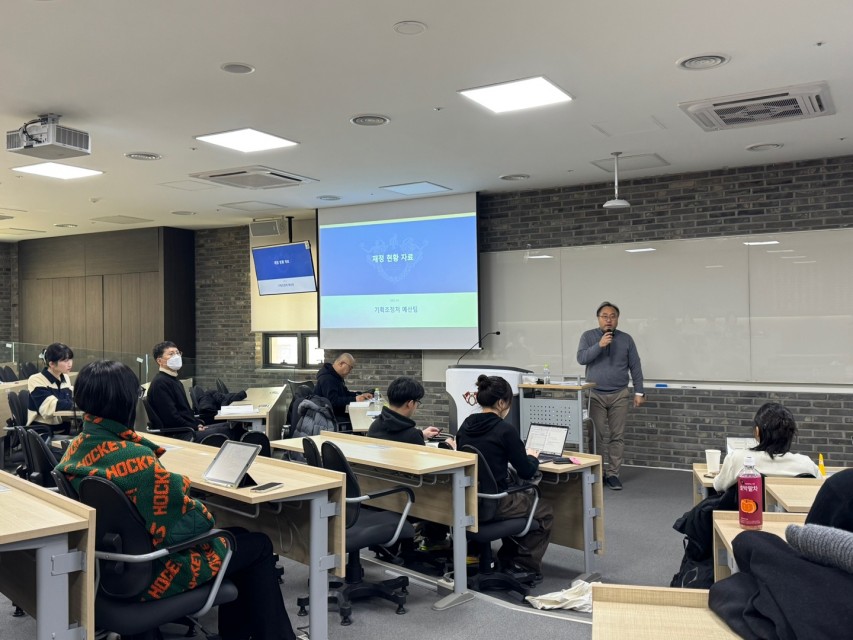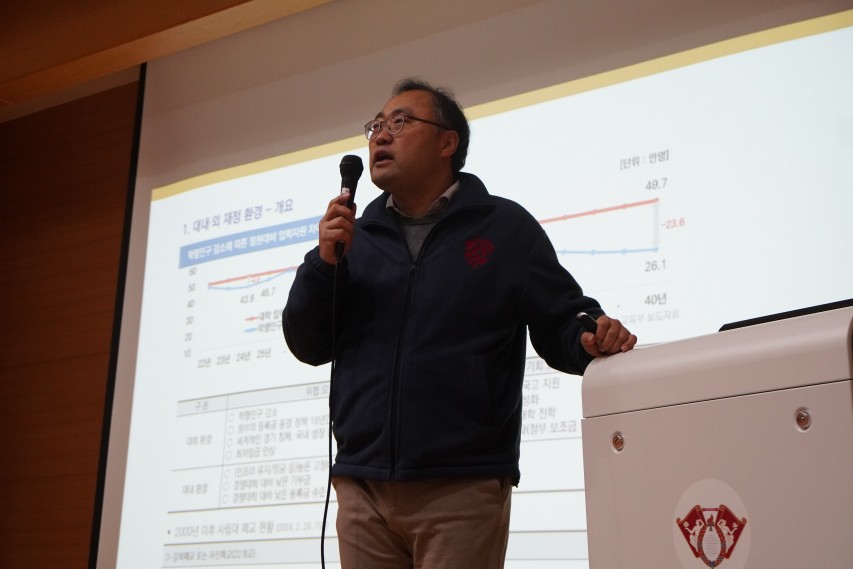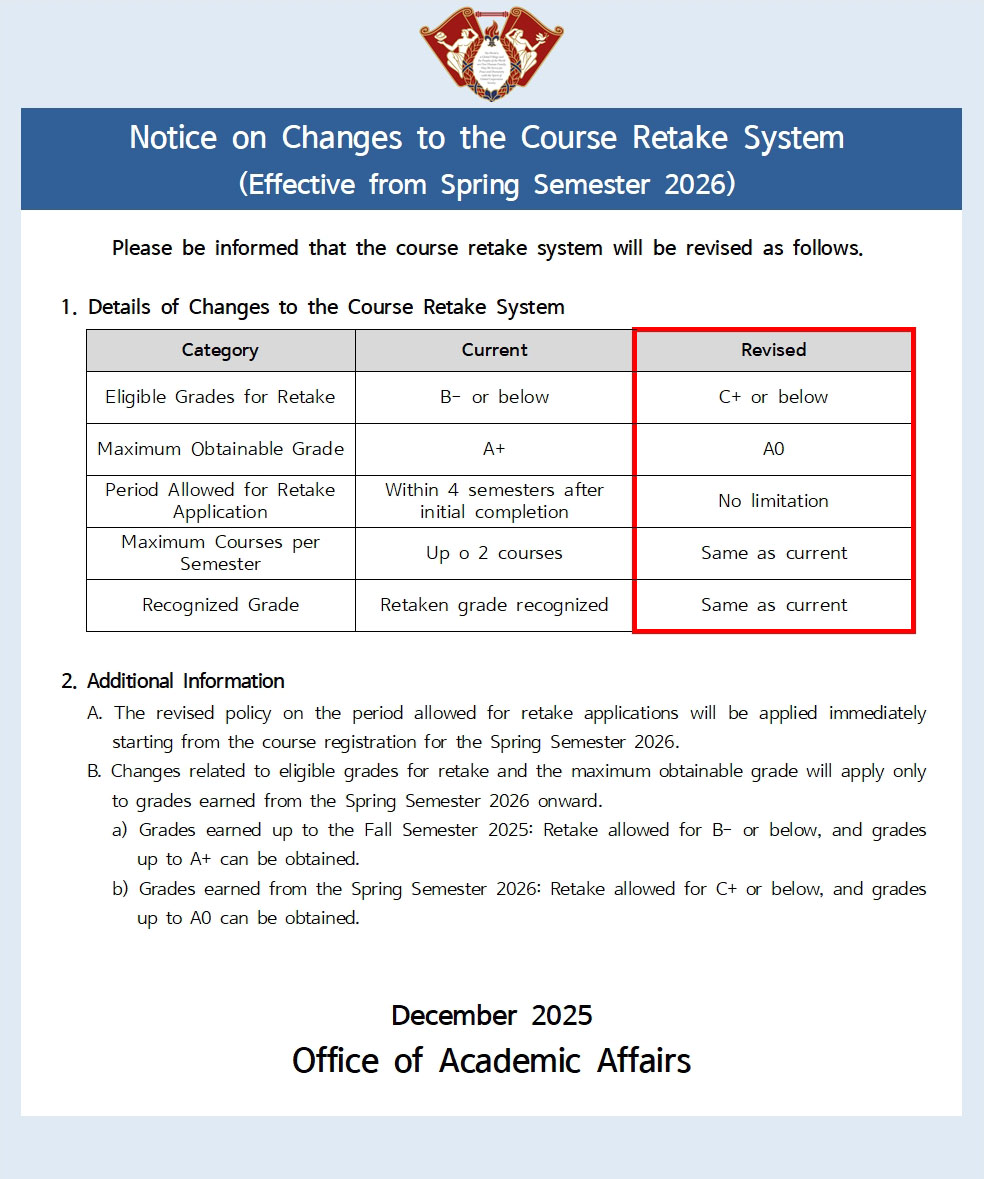[Campus] Kyung Hee University Raises Tuition by 5.1% for the First Time in Sixteen Years
Kyung Hee University (KHU) has decided to increase tuition fees by 5.1% for the first time in sixteen years with the unanimous approval of the 2025 Tuition Deliberation Committee. As the University has announced that the additional revenue from the tuition increase will be invested in student welfare and enhancing the University's prestige, students' attention is focused on how the University will implement these plans.
Kim Do-gyun, from the OPC, is explaining the reason of tuition fee rise at Global Campus
Photo by Oh, Eun-je / The University Life
Reasons for Raising Tuition Fees: Financial Difficulties
The primary reason why KHU decided to raise tuition fees is financial difficulties due to inflation.
KHU has kept tuition frozen since 2009, while other universities began doing so in 2012, further widening the financial gap. As a result, KHU has been receiving lower tuition income each year, with an annual shortfall of 400,000 won per student compared to the national average.
While the tuition freeze was in place, the University’s financial burden grew. Kim Do-gyun, the Deputy Director of the Office of Planning & Coordination (OPC), explained the necessity of raising tuition, stating, "Minimum wages have risen by approximately 100% over sixteen years, and consumer prices have increased by approximately 35%. Given this, maintaining a tuition freeze is effectively the same as a tuition decrease in real terms."
The Discussion Process on Tuition Increase
The tuition fee increase was determined through various processes. Despite the University’s efforts to explain the reasons through information sessions and meetings, communication has not been as smooth as expected due to several concerns. Students have primarily questioned the rate of increase, the suspension of National Scholarship support, and the University’s financial structure.
Discussions on the tuition increase have been ongoing since December 2024. The first financial operation briefing session, supervised by the OPC, was held on December 23 and 24. This was followed by the second financial operation briefing session, which took place on both campuses on January 14 and 15, 2025. These sessions were led by the Deputy Director and the Policy Director of the OPC and included a question-and-answer segment to engage with students. As a result, approximately 70 attendees including both general students and student representatives, participated in these discussions.

The second financial operation briefing session at Seoul Campus
Photo by Oh, Eun-je / The University Life
On January 15, the proposal of the tuition increase was approved by the Expanded Executive Committee on both campuses. On January 17, the Tuition Review Committee, consisting of faculty, students, and relevant experts, convened to deliberate and vote on the tuition increase proposal.
During the tuition increase process, students raised several concerns, leading to adjustments to the initial proposal. The OPC initially considered increasing the tuition fee by 5.49%, which is the maximum rate allowed by law. However, this unexpected decision was seen as a potential financial burden on students, prompting a reconsideration of the rate.
In response, Shin Ha-kyun, the president of the Emergency Planning Committee of the General Student Association on the Seoul Campus, and Park Byung-jun, the president of the General Student Association on the Global Campus, consolidated their opinions and requested the University to adjust the rate of increase. Following additional discussions, the tuition increase was set at 5.1%.
Shin stated, "We believed that the legal maximum increase rate would be a significant burden on students, especially those in fields such as the arts and medical sciences, where practical training costs account for a large portion of expenses. Based on this concern, we requested the University to lower the increase rate, and through negotiations, it was set at 5.1%."
Another concern is the suspension of National Scholarship Type 2 support. This scholarship program involves collaboration between universities and the government to provide financial aid to students. Until now, universities were required to freeze tuition to receive government funding.
In response to student concerns over the suspension of National Scholarship support due to the tuition increase, the University has stated that it will seek ways to ensure that students can retain the amount they have previously received. Kim said, "We are planning to allocate three to four billion won to substitute the financial support that was previously provided by the National Scholarship Type 2."
The University’s financial structure has also been a point of debate. At KHU, tuition fees account for 61% of its annual income, a relatively high proportion compared to other universities. This makes increasing tuition the easiest way to address financial difficulties, leading some students to question why they must bear the burden of solving the University’s challenges, as raised during the financial operation briefing session.
In response, Kim explained that the University is working to reduce its reliance on tuition fees. He stated that KHU is expanding its income sources through donations and facility rental fees. Additionally, he mentioned that the University is considering establishing contract-based departments to generate revenue through corporate agreements.
Regarding the status of non-tuition income, he highlighted, "In fact, donations increased from 6.9 billion won in 2021 to 11 billion won in 2024, while facility rental fees rose from 5.7 billion won to 14.2 billion won."
Plans for Tuition Revenue Allocation: Investment in Enhancing Student Satisfaction and University Prestige
Through the tuition increase, KHU will generate an additional 10 billion won. OPC stated that the additional revenue would be used to enhance student satisfaction and the University’s prestige.
With a 5.1% tuition increase, students in the humanities will pay an additional 160,000 won, while students in the science, technology, engineering and mathematics fields will pay an additional 218,000 won. KHU’s increase rate is approximately 0.2% higher than that of other universities in the Seoul metropolitan area. However, the actual amount of the increase is lower since KHU's tuition fees were already below those of other universities.
Among the 10 billion won in additional income, three to four billion won will be allocated for scholarships and student support programs. Since the university is no longer eligible to receive National Scholarship Type 2 due to the tuition increase, this portion of the income is to compensate for the lost funding.
Four to five billion won will be invested in educational facilities. Shin stated, "In surveys, the top priority for students is facility renovation. However, building construction and renovation are costly, and in order to meet students' demands, a tuition increase is necessary."
The remaining amount, around two billion won, will be used for research funding and the purchase of educational research equipment.
To cope with rising inflation, the university decided to increase tuition fees by 5.1%. As a result, KHU will gain an additional 10 billion won, which will be allocated to top priorities such as student welfare, facility improvements, and research support. Since the tuition increase aims to tackle long-standing issues, monitoring whether this change improves the educational environment remains a key concern for both the University and the students.
There are no registered comments.
I agree to the collection of personal information. [view]



